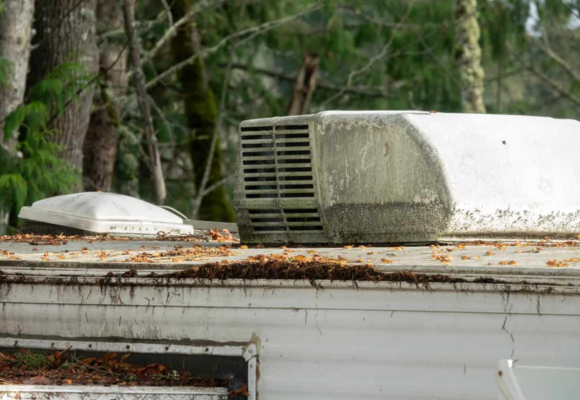Owning an RV is like having a slice of home on wheels. As with any cherished possession, it’s essential to maintain and protect it. One of the most critical aspects of an RV is its roof.
Given that it constantly faces the elements – from the scorching sun to relentless rain – having a reliable roof coating becomes necessary.
The right coating can extend the lifespan of your RV’s roof and enhance its performance against the unpredictable outdoors.
But, with so many available options, how does one decide on the best roof coating for an RV?
This article aims to simplify this choice. Whether you’re a seasoned traveler or just starting your RV journey, we’ll guide you toward making an informed decision.
After all, protection starts from the top!
| Best Roof Coatings for your RV | |
|---|---|
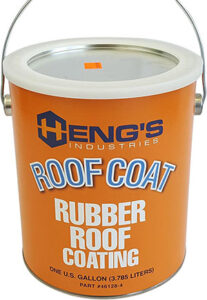 |
Heng’s Rubber Roof Coating Check Price |
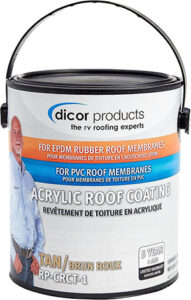 |
Dicor RP-CRC-1 EPDM Rubber Roof Acrylic Coating Check Price |
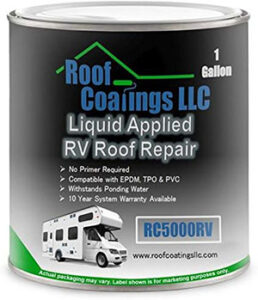 |
Liquid RV Roof Coating & RV Roof Repair Check Price |
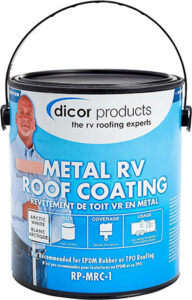 |
Dicor RP-MRC-1 Acrylic Elastomeric Coating for Metal RV Roofing Check Price |
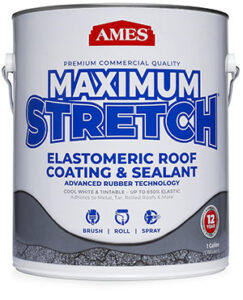 |
Ames Maximum Stretch – Waterproof Sealant Membrane for Roofing Check Price |
What to Consider Before Choosing an RV Roof Coating for Your RV
For the dedicated traveler, an RV is more than just a vehicle; it embodies wanderlust, a comfort zone, and a home that ventures with you.
Ensuring that your RV is in top-notch condition is pivotal, and the roof is undeniably the front liner in shielding your precious home-on-wheels from nature’s whims.
When pondering over the best roof coating for your RV, there are myriad considerations to ponder over.
Let’s delve into the essential factors you should consider to make the most informed choice.
Understand Your RV Roof Type
Before you delve into the vast realm of RV roof coatings, the paramount step is to ascertain the type of roof your RV boasts.
With EDPM, TPO, Fiberglass, and Aluminum leading the spectrum, each demands a specific coating.
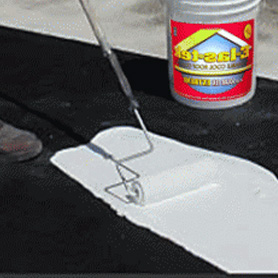
A mismatch can lead to ineffective results and even deteriorate the roof’s quality. If you are in doubt, always consult the RV manufacturer to ensure you’re on the right track.
Depending on the material, you might also consider the benefits of furring strips under metal roofing. Always contact your RV manufacturer if you are unsure about your roof type.
Assess the Roof’s Present Condition
Before applying any coating, a thorough assessment of your RV’s roof condition is vital.
Issues such as cracked sealants, worn-out patches, or visible damage must be addressed upfront.
Remember, a fresh coat on a compromised roof won’t work magic. It’s imperative to mend any foundational issues before you proceed.
For those with shipping containers converted into living spaces or mobile homes, understanding the nuances of a roof coating for shipping containers can be helpful.
Address Pre-existing Leaks
Water leaks can be the nemesis of your RV’s interiors. If there are any signs of leakage or water damage, prioritize attending to them.
Not only can they cause extensive damage over time, but they can also render your new roof coating futile if not addressed.
Familiarize yourself with signs of roof leakage, and should any arise, act swiftly.
If you’ve noticed asphalt shingles on your RV, consider reading up on the roof coating for asphalt shingles to ensure optimal protection.
Repair Roof Holes
RV roofs are prone to occasional holes from installations, natural wear, or unexpected incidents like falling tree branches.
Before even thinking about a fresh coat, ensure that all holes, however minute, are adequately repaired. Integrity is key; a hole-free roof will ensure the coating adheres effectively and lasts longer.
For those with galvanized metal roofs showing signs of wear, choosing the right paint for a rusted galvanized metal roof can be crucial.
Sealants: Check, Maintain, and Choose Wisely
Sealants are the unsung heroes in maintaining the robustness of your RV’s roof. Constant exposure to external elements makes them susceptible to wear.
Regular checks and timely maintenance can ward off potential roof troubles. Moreover, not all sealants are created equal.
It’s not just about having a sealant; it’s about having the right one.
Always opt for RV-specific sealants and avoid generic solutions that might not be up to the task.
DIY vs. Professional Help
Recoating your RV’s roof might sound enticing, but assessing your qualifications is essential.
Roof tasks can be tricky, and safety should never be compromised.
If you’re unsure about your footing or the intricacies of the job, it might be best to call in the professionals.
Yes, there might be an added cost, but peace of mind and the assurance of a well-done job can make it worth every penny.
What Are the Best RV Roof Coating For Your RV?
1. Heng’s Rubber Roof Coating
Heng’s has carved a niche by consistently offering high-quality products, and this particular item is no different.
Crafted out of rubber, its very essence signifies durability and adaptability. Rubber, as we know, is renowned for its flexibility, and it’s evident that this product is meant to last.
Speaking of its design, the 6.5 x 11.9 x 7.5 inches dimensions make it a compact choice.
This trait signifies that it’s suitable for situations where space might be a constraint or when one is seeking something less bulky. The weight of 5 pounds further reinforces the idea of portability.
One of the standout features has to be its utility in the RV sector.
It’s tailored for use over RV rubber roofs, sealing vents, and air conditioners and also addresses seams and tears. This multi-purpose attribute enhances its value proposition manifold.
UV resistance is a massive boon for any outdoor product, and Heng’s doesn’t disappoint.
The ability to resist cracking, especially when the material is subjected to varying temperatures and conditions, is commendable.
Not only does it adjust to the expanding and contracting nature of roofs, but it also boasts an impressive resistance to impact.
The product’s non-polluting and non-toxic nature is the cherry on the cake, ensuring the environment remains unharmed.
Last but not least, the gallon size availability ensures that users have a substantial quantity at their disposal, potentially reducing the frequency of repurchases.
In conclusion, Heng’s compact rubber product is an impressive offering for those needing a durable and multi-functional sealing solution.
The pros certainly outweigh the cons, making it a noteworthy investment for RV enthusiasts and others.
For further insights, you might want to check or compare rubberized roof coating with similar products’ rubberized roof coating.
- Multipurpose Utility: Its design to suit RV rubber roofs and other applications makes it a versatile product.
- UV Resistant and Durable: Its resistance to UV, cracking, and impact assures longevity.
- Eco-friendly: The non-toxic and non-polluting nature ensures it’s safe for the environment.
- It’s great for RV rubber roofs but might not be suitable for other materials or surfaces.
- Size Limitation
2. Dicor RP-CRC-1 EPDM Rubber Roof Acrylic Coating
When considering the vast array of roofing solutions available today, Dicor’s acrylic offering stands out, particularly in RV maintenance and protection.
The RP-CRC-1 EPDM Rubber Roof Acrylic Coating is a testament to the brand’s commitment to quality and user-centric design.
The acrylic material is recognized in the industry for its durability and adaptability.
This specific formulation by Dicor brings forth a coating that, once applied, offers a slew of benefits tailored to the unique challenges RV roofs often face.
The white finish imparts a clean and crisp look and aids in reflecting sunlight, thus reducing heat absorption.
With dimensions of 8 x 6.5 x 6.5 inches and a weight of just a pound, it becomes evident that the product is designed for easy handling and application.
This becomes especially beneficial when working atop an RV, where balancing ease and efficiency is crucial.
The product description reveals several standout features.
The universal fit, suggesting its suitability for retrofit installations, ensures flexibility for users with varying RV models.
Its ability to flex well means the coating can adapt to temperature changes, expansion, and contraction without compromising its protective properties.
For those familiar with the persistent issue of roof rumble, this product promises a significant reduction, providing a quieter, more pleasant RV experience.
Moreover, the emphasis on reduced lifetime maintenance speaks to its longevity and the cost savings in the long run.
The specific gravity figure of 1.41 further attests to the product’s density and consistency.
Conclusion:
When finding the best roof coating for RV, the Dicor RP-CRC-1 EPDM Rubber Roof Acrylic Coating emerges as a top contender.
Its array of features, combined with Dicor’s renowned quality, makes it a wise investment for any RV owner looking to ensure longevity and protection for their vehicle’s roof.
- Universal Retrofit Capability: It is a versatile solution for diverse RV models.
- Significant Flexibility: Adapts to temperature fluctuations, ensuring sustained protection.
- Low Maintenance: Its durable nature means less frequent reapplications and touch-ups.
- Weight Considerations: At 1 pound for its volume, some users might find it slightly denser than preferred.
- Specific Gravity: A figure of 1.41 indicates it’s denser than other coatings, which could influence application ease.
3. Liquid RV Roof Coating & RV Roof Repair
Navigating the world of RV roof coatings can be daunting, but Roof Coatings LLC has crafted a product that stands out amidst its competitors.
With its distinctive specifications and notable features, the Liquid RV Roof Coating & RV Roof Repair establishes itself as a prominent contender for those seeking durability, reliability, and an aesthetically pleasing finish for their recreational vehicles.
Firstly, choosing Polyvinyl Chloride as the primary material emphasizes the product’s dedication to strength and resistance against various elements.
This material and the product’s liquid form ensure that the application is smooth, seamless, and uniform.
Its compatibility is certainly commendable. It is tailored for Polyvinyl Chloride surfaces and bonds seamlessly with materials such as EPDM, TPO, Hypalon, and even Fiberglass – all without needing a primer.
Such versatility allows RV owners to bypass the hassle of searching for specialized surface coatings.
The product’s efficiency speaks volumes. With the ability to cover 100 square feet per gallon per coat and the requirement of just two coats, it offers a coverage ratio that’s both cost-effective and labor-saving.
The highly reflective white color adds to the RV’s aesthetic appeal and reflects sunlight, potentially reducing the internal temperature.
Including a 20′ repair fabric with each order is a thoughtful touch, catering to minor repair needs and enhancing the overall value of the purchase.
The comprehensive 10-year system warranty, contingent on adherence to the guidelines, underscores the brand’s confidence in the product’s longevity and performance.
Conclusion:
For those searching for the best roof coating for RV, the Liquid RV Roof Coating & RV Roof Repair by Roof Coatings LLC is a robust choice.
Its versatility, efficiency, and durability make it a premier solution for RV enthusiasts who prioritize functionality and aesthetics.
This product is a testament to the brand’s commitment to excellence and user satisfaction.
- Versatile Compatibility: Bonds with a range of materials without needing a primer.
- Efficient Coverage: Covers a large area with minimal product, ensuring cost-effectiveness.
- Comprehensive Package: Comes with a 20′ repair fabric and offers a 10-year system warranty.
- Multiple Applications Required: Two coats are necessary for optimal results, which might extend the application process.
- Specific Preparation Steps: The 10-year system requires meticulous application, including cutting around all penetrations and seams, which might be intricate for some users.
4. Dicor RP-MRC-1 Acrylic Elastomeric Coating for Metal RV Roofing
In the vast sea of RV roofing solutions, Dicor’s newest addition, the Acrylic Elastomeric Coating, is specifically tailored for metal RV roofs and is poised to make significant waves.
Let’s delve deeper into what makes this product a notable contender in RV roof coatings.
Right from the outset, the material choice reveals a blend of acrylic and elastomeric properties.
Acrylic, a trusted medium, ensures durability, while the elastomeric feature guarantees flexibility and adaptability, which is especially crucial given the varying conditions an RV might be exposed to during its travels.
The specialization for metal RV roofing is a thoughtful touch. Metal roofs, while durable, can be prone to issues like rust, corrosion, and temperature-related expansions and contractions.
This coating acts as a protective shield, mitigating the challenges faced by metal roofing and prolonging its lifespan.
The formulation ensures that it doesn’t just sit atop the surface but bonds deeply, creating a secure seal.
This bond protects the roof from leaks, UV damage, and other wear and tear. Given the rigors of travel, this defense is essential for RV enthusiasts, providing peace of mind on the road.
A unique attribute of this coating lies in its formulation. Comprised of 100% acrylic elastomeric resins, the coating morphs into a rubber-like shield that can effortlessly expand and contract harmoniously with the roof’s movements.
This dynamic adaptability ensures longevity and minimizes wear and tear associated with travel and varying weather conditions.
While the coating is washable, a boon for maintenance, its primary function is protection and beautification.
Specifically tailored for metal substrates like aluminum and steel, it guards the roof against potential damage and wear while enhancing its visual appeal.
Conclusion:
When scouting for the best roof coating for RV, Dicor’s Acrylic Elastomeric Coating emerges as a top pick, especially for metal RV roofing.
It represents a blend of innovation and trusted quality, ensuring your RV remains shielded from the elements and serves as a reliable home on wheels.
This product is a testament to Dicor’s commitment to enhancing the RV experience.
- Specialized Design: Tailored explicitly for metal RV roofs, ensuring optimal protection.
- Dual Material Benefits: The acrylic-elastomeric blend provides both durability and flexibility.
- Superior Bonding: Offers a deep bond, ensuring a secure seal and prolonged protection.
- Material Specific: While perfect for metal roofs, it might not be suitable for RVs with different roofing materials.
- Potential Application Learning Curve: Due to its specialized nature, first-time users might need to understand the best application methods.
5. Ames Maximum Stretch – Waterproof Sealant Membrane for Roofing
For homeowners and RV enthusiasts, a resilient roof coating that delivers durability and energy efficiency is paramount.
Enter the Ames Maximum Stretch: a sealant membrane that promises to redefine the standards of roofing solutions.
A standout characteristic of this product is its astounding 650% elongation capacity.
Such a feature ensures that the product remains adaptable to diverse conditions, effectively resisting the common challenges of cracking and peeling.
This flexibility speaks volumes of its longevity and the peace of mind it offers users.
Moreover, the radiant white finish does more than appease the eyes.
With an impressive 88% light reflectivity, this coating ensures that surface temperatures remain regulated, directly translating to substantial savings in cooling costs.
This dual functionality of aesthetics and efficiency makes it a commendable choice for modern roofing requirements.
The product’s adherence versatility is another hallmark, showcasing its capability to bond with myriad surfaces, including metal roofs, tar, and rolled roofs.
Furthermore, the eco-friendly, non-toxic formulation and its low VOC align with the growing demand for gentle, sustainable products in our environment.
Adding another layer of trust to this product is its origin and backing.
Made proudly in the USA, the sealant is a testament to top-tier American craftsmanship.
Moreover, the fact that Ames Waterproof Coatings is a woman-owned enterprise founded by a veteran lends more weight to the brand’s credibility. It’s a compelling narrative of empowerment, determination, and the American dream.
Conclusion:
When scouting for the best roof coating for RV and other applications, Ames Maximum Stretch stands tall as a reliable contender.
Its blend of flexibility, energy efficiency, and versatile adherence capacity ensures that your roofing remains robust and efficient.
If you’re seeking a product that embodies durability and modern roofing innovations, this sealant membrane is a worthy investment for the long haul.
- Extreme Elongation: The 650% elongation ensures unparalleled flexibility, countering cracks and peels.
- Energy Efficiency: The 88% light reflectivity effectively reduces surface temperatures, leading to cost savings.
- Versatile Adherence: Bonds efficiently with diverse roofing materials, making it apt for various applications.
- Weight: Weighing in at over 50 pounds, some might find the product too heavy for manual application.
- Specific Design: Primarily designed for low-slope roofs, which may limit its applicability for certain roofing types.
Additional Buyer’s Guide: Best Roof Coating for RV
Your RV is not just a vehicle; it’s a home on wheels. Like any home, it requires maintenance and protection to withstand external factors and ensure longevity.
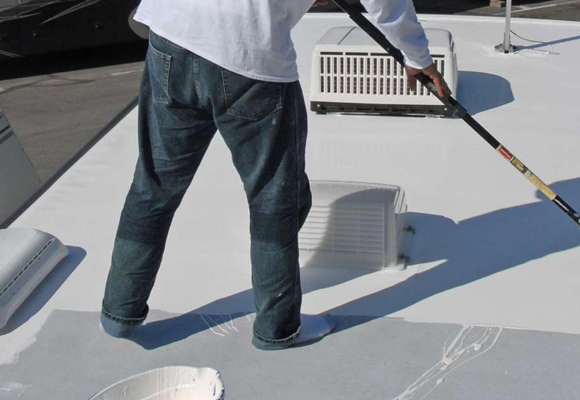
The roof is one of the most crucial parts of your RV that demands attention. A quality roof coating not only preserves the integrity of your RV’s roof but also affects the vehicle’s internal environment.
With numerous products available in the market, choosing the right one can be daunting.
This guide aims to simplify that decision-making process for you. We’ll arm you with the knowledge you need to make an informed choice by highlighting the critical features to consider and why they matter.
Let’s dive in!
1. Material Composition
The first aspect to consider when hunting for the best roof coating for an RV is its material composition.
Acrylic, silicone, rubber, and polyurethane are the most commonly used materials.
Acrylic is water-based and offers excellent UV protection but may not be as durable as silicone.
Silicone coatings are highly weather-resistant and last longer but can be pricey.
Rubber or EPDM coatings balance durability and cost well, while polyurethane is known for its robust impact resistance.
Depending on your specific needs, environmental factors, and budget, decide which material suits your requirements.
For instance, metal roofs might benefit from specialized coatings like a TICN coating.
2. UV Protection and Reflectivity
RVs are often exposed to the harsh sun, which can deteriorate the roof and increase the vehicle’s internal temperature.

A roof coating that offers high UV protection can prevent sun damage, ensuring longevity for the roof’s material.
Similarly, coatings with high reflectivity can repel a significant amount of sun rays, keeping the RV cooler.
This feature can be especially beneficial in warmer climates and during the scorching summer months.
A vital feature of any roof coating is its ability to withstand diverse climatic conditions.
From scorching sun to icy cold, your coating should offer protection. Consider a solar reflective coating for those sun-soaked journeys.
3. Application Ease
Consider the application process of the roof coating. Some might require primers or multiple coats, while others can be directly applied.
Check if the product can be rolled on, brushed, or sprayed.
Some products might need a professional application, while others can be easily handled as DIY projects.
Be sure to read the manufacturer’s instructions and reviews to gauge the ease of application.
The lifespan of your coating matters. Some coatings offer extended protection, reducing the frequency of recoating. If you’re considering a refresh, checking guidance on roof coating over a new roof is worthwhile.
Cost Efficiency
While initial costs are a factor, think long-term. Will the coating save money in the long run by reducing damage or the need for frequent reapplications?
Places like Camping World or Amazon can be ideal for comparing prices and user reviews.

4. Elongation and Flexibility
One of the key features of a reliable roof coating is its ability to expand and contract with changing temperatures without cracking or peeling.
This property is known as elongation.
A high elongation percentage ensures the coating remains intact despite the roof’s movement or external pressure.
Flexibility ensures the coating can withstand physical impacts, such as tree branches brushing against the roof, without sustaining damage.
5. Eco-Friendliness and VOC Content
With growing consciousness towards the environment, opting for eco-friendly products is essential.
Check the Volatile Organic Compound (VOC) content of the roof coating.
Lower VOC levels indicate that the product is less environmentally harmful and safer for personal health.
Some coatings also come with non-toxic formulations, further enhancing their environmental compatibility.
Biodegradation and environmental impact are becoming pivotal considerations.
Opt for coatings that have a minimal environmental footprint, ensuring your adventures remain green.
Conclusion:
Selecting the best roof coating for your RV is a critical decision that directly impacts the lifespan of your vehicle’s roof and the internal environment.
You can make an informed choice by focusing on the highlighted features, such as material composition, UV protection, ease of application, flexibility, and eco-friendliness.
Remember, a good quality roof coating is an investment in the longevity of your RV and the comfort of your journeys.
Consider your specific needs and consult with experts or user reviews before deciding.
Safe travels!
Frequently Asked Questions
What is the best product to use on an RV roof?
The best product for an RV roof largely depends on the material of the roof.
For instance, EPDM rubber roofs often benefit from specialized EPDM coatings, while fiberglass roofs might require a different formulation.
Popular brands that cater to RV roof coatings include Dicor, Liquid Roof, and Heng’s.
Always check the product’s compatibility with your RV’s roof material and read user reviews before purchasing.
What is the best thing to seal an RV roof with?
When sealing an RV roof, you’ll want to prioritize a product that offers excellent waterproofing capabilities, UV resistance, and compatibility with your roof’s material.
EPDM-specific sealants, like those from Dicor, are highly recommended for rubber roofs.
Meanwhile, a high-quality elastomeric or silicone sealant can be ideal for metal or fiberglass roofs.
Remember, ensuring the sealant is designed for RVs is crucial as it typically needs to withstand more movement and temperature fluctuations than stationary structures.
What is the most durable roof coating?
Durability in roof coatings can be subjective and is influenced by various factors, including the application process, climate, and maintenance.
However, elastomeric roof coatings are widely recognized for their longevity and ability to expand and contract with temperature changes.
At the same time, often more expensive, silicone-based coatings offer excellent water resistance and UV protection.
Products like those from the Liquid Roof line or the GacoRoof 100% Silicone Roof Coating tend to rank high in durability among users.
Should I coat my RV roof?
Coating your RV roof is generally a good idea for several reasons: Protection from Elements:
A quality coating can protect your RV roof from harmful UV rays, rain, ice, and other environmental factors that can lead to degradation.
Extend Roof Life: Regularly applying a roof coating can extend the lifespan of your RV roof, preventing costly replacements. Prevent Leaks: Coatings are a barrier, preventing water seepage and potential interior damage. Temperature Regulation: Some coatings have reflective properties, which can help keep your RV cooler in hot weather, reducing the strain on air conditioning systems.
That said, before you decide to coat, ensure you inspect the roof for any existing damage, clean it thoroughly, and choose a coating compatible with your RV’s roof material.

Arthur is a skilled roof worker with over 10 years of experience in the industry. He started his career as an apprentice and worked his way up to become a foreman.
When he’s not working on roofs, John enjoys with his family or writing posts. He is also a passionate cyclist.

